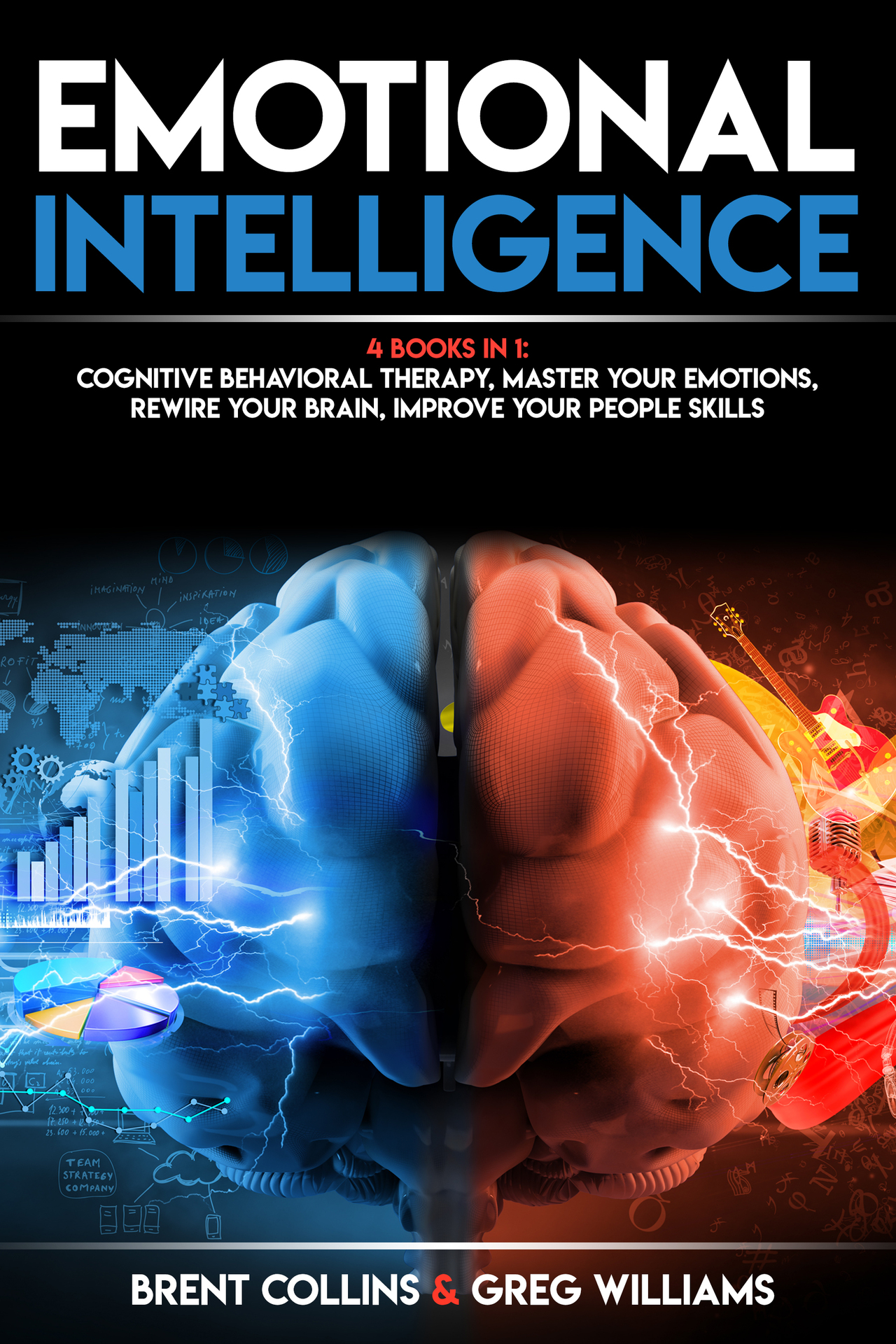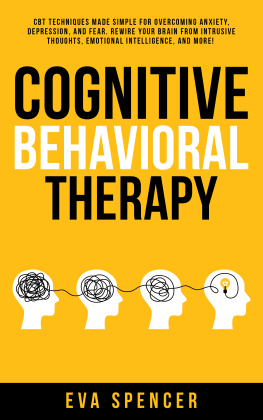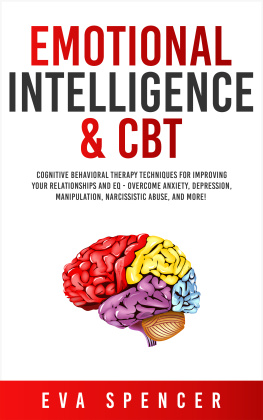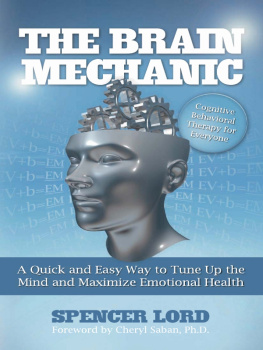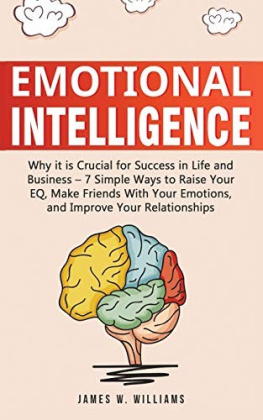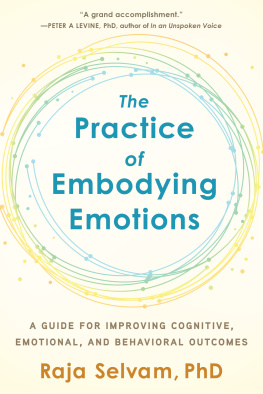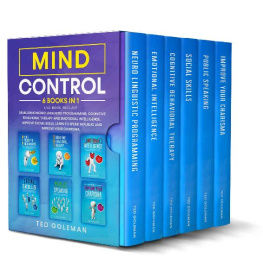EMOTIONAL INTELLIGENCE
4 BOOKS IN 1
COGNITIVE BEHAVIORAL THERAPY, MASTER YOUR EMOTIONS, REWIRE YOUR BRAIN, IMPROVE YOUR PEOPLE SKILLS
By Brent Collins & Greg Williams
Copyright 2020 By Brent Collins & Greg Williams
All rights reserved.
Any duplication, reproduction, and publication outside the provisions of copyright law are not permitted as a whole or in part without the prior written consent of the author.
This work is not intended to give specific recommendations and merely provides general guidance, exemplary illustrations, and personal views. Author, publisher and cited sources are not liable for the implementation of their thoughts and views. Any liability is excluded.
The advice and information published in this book have been carefully prepared and reviewed by the author. It is strongly recommended not to rely solely on this book, but to conduct its own investigations.
This book set includes :
Book 1) : Practical Guide To Permanent Freedom From Anxiety, Negative Thoughts, Anger, Panic, Low-Self Esteem and Improve Your Day Life
Book 2) : The Ultimate Practical Guide To Overcoming Anxiety, Negative Thinking, Emotional Stress, Better Manage Your Feelings and Improving Your Self-Esteem
Book 3) : Change Your Habits To Stop Overthinking. Reduce Anxiety, Phobia & Stop Panic Attacks. Control and Improve Your Life with A Permanent Positive Thinking.
Book4 ) : A Guidebook to Improve Your Social Skills, Win Friends, Unleash the Empath in You, Influence People and Raise Your Emotional Quotient
TABLE OF CONTENT :
COGNITIVE BEHAVIORAL THERAPY :
PRACTICAL GUIDE TO PERMANENT FREEDOM FROM ANXIETY, NEGATIVE THOUGHTS, ANGER, PANIC, LOW-SELF ESTEEM AND IMPROVE YOUR DAY LIFE
By Brent Collins
Copyright 2019 By Brent Collins
All rights reserved.
Any duplication, reproduction, and publication outside the provisions of copyright law are not permitted as a whole or in part without the prior written consent of the author.
This work is not intended to give specific recommendations and merely provides general guidance, exemplary illustrations, and personal views. Author, publisher and cited sources are not liable for the implementation of their thoughts and views. Any liability is excluded.
The advice and information published in this book have been carefully prepared and reviewed by the author. It is strongly recommended not to rely solely on this book, but to conduct its own investigations.
Table of Contents
Chapter 1: What Is Cognitive Behavioral Therapy?
What crosses your mind every time you hear of the word mental illness? This has been a sensitive topic of discussion for a while. At times, we do not want to speak about it perhaps due to the chaos it brings in our lives. Statistics show that there is a rise in the number of people being diagnosed with mental illnesses daily. At the end of the day, the question we all ask is: is there a cure? Well, researchers are working day and night to establish a solution for this issue, and with their discoveries, we can say that there is hope at the end of the tunnel. Cognitive-behavioral therapy (CBT) is a reason to be hopeful.
We can begin by defining each word independently.
Cognitive: It comes from the word cognition, which refers to the mental process of obtaining understanding and knowledge experience, thoughts, and senses.
Behavioral: It comes from the word behavior, which refers to the range of actions and conduct of oneself in response to specific situations or stimuli.
Therapy: It refers to medical treatment for a health issue.
Put together, this is what Cognitive-Behavioral Therapy is:
It is a type of therapy that aids in problem management by transforming one's thoughts and behavior.
It involves improving mental health by modifying behavior, emotions, and thoughts.
It is a psychotherapeutic treatment that aids patients in knowing their feelings and thoughts that affect their behavior.
Cognitive behavioral therapy focuses on our thoughts, emotions, beliefs, attitudes, and behavior. You find that these aspects can affect one's mental health whenever there is a cognitive distortion. The concept behind this therapy is to improve the emotional regulation and to come up with strategies that can help in solving the problem. At first, CBT was designed to help people suffering from depression. However, it has been found effective in treating other mental illnesses such as anxiety. Cognitive behavioral therapy involves several treatments that are carried out to improve mental health based on strategies and techniques that have been proven to work. The therapist aims at looking at the problem presented, and then comes up with a solution for the issue at hand.
You find that depression and other mental illnesses are influenced by our thoughts, emotions, and behavior. When one is faced with a tragedy, they respond to it through emotions, feelings, and behavior. We can address this by evaluating various possible situations that can result in one being depressed. For instance, let us use the scenario where one gets out of a relationship they have been in for years. This is a person who has invested their time, energy, and resources in the relationship for years. Then one day, the other party decides to end things. It will take time to process the information depending on how one can handle situations. The possible emotions this person is likely to have are anger, regret, sadness, and self-pity. These emotions will influence their behavior, which affects those around them. They may treat others inappropriately which is not acceptable. This does not happen to all people but to those who are unable to manage their emotions.
Many people think that the inability to handle stress is a weakness, but it is not. In case you are struggling with such a situation, know that it is reasonable and you can be helped, which is why we have treatments like cognitive behavioral therapy that can help in improving your mental health. The first and most significant step is identifying that there is a problem. Most people who are going through mental illnesses do not want to acknowledge that they are going through those challenges. They, at times, hide from the fact that they are facing something until the level gets too extreme. The truth of the matter is, you will be surprised by the number of people going through the same issue. This fact does not mean that it is good to live with it just because other people are. No, that is not the case. It is aimed at showing that it is something that happens, and instead, it is not something peculiar that should make you feel stigmatized. After identifying that you have a problem, the next step is to come up with a solution. In this case, it is a mental problem, so the best person to approach is a specialist in that field who will refer you to a therapist based on your issue.
In cognitive behavioral therapy, the first step will involve accessing the problem. In our case, it is a relationship problem. The therapist locates how this issue has affected your emotions and behavior. You carry out an intimate talk where you have to be transparent about the problems that you are facing. In such sessions, it is also good to be completely honest and not to leave out any necessary information. By doing so, you will ensure that the therapist is in a situation where they can quickly help. The next step is finding a solution to your problem. Now, here, they use the strategies and tactics that have proven to work in similar cases they have tackled before. You are probably wondering how effective this is. Well, while treating mental illnesses, we cannot say that all treatments are 100% effective. It mainly relies on the success of previous trials. If they have been proven to work in most scenarios, then we view them as valid. Mental illnesses are complex, and daily, research is being carried out to find solutions. We get to work with the discoveries provided as we continue to improve them and make the world a better place. In this case, cognitive behavioral therapy is one of those approved mental health treatments.

